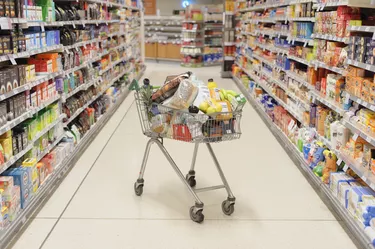
Continuing strains in the supply chain have resulted in high grocery bills. Almost every food item is now expensive. Food costs have risen 10.9 percent from July 2021 to July 2022.
But how do you deal with the rise in food costs and still put healthy food on the table? Here are some grocery hacks to help you save.
Video of the Day
Video of the Day
Watch Those Sales
Although sales can be a good thing most of the time, they can sometimes convince you to overspend. Many grocery stores encourage bulk buying with the lure of saving money. But bulk buying isn't always the best move.
You'll need to watch that unit price. Just because it says that something is three for $5 doesn't mean that the unit price is less expensive. It might actually cost more per item than regularly. So don't be fooled by purchasing multiple items when one item might be less expensive.
And even if it is a better price, can you really use two bags of apples before they go bad? That's not a deal if you can't use what you buy. Spending $10 to buy five items when you only need one has just made you spend more than you needed.
Use Frozen Vegetables
Eating healthy is vital. That's why many people head to the produce section when they go grocery shopping. But fresh produce is expensive. Frozen vegetables are more economical and in some cases, can be more nutritious than fresh ones.
And keep in mind that sometimes, fresh produce isn't really that fresh. Because it takes time to ship fruits and vegetables, they are often picked before they're ripe. Because of this, the produce doesn't have time to reach its full nutritional value. According to the USDA, some produce can be stored for up to 12 months. And Produce that is shipped is often treated with chemicals to prevent spoilage.
Frozen foods are frozen within a few hours of being harvested. Usually, chemicals are not used for the freezing process with the exception of fruit, which is often treated with ascorbic acid, a form of vitamin C.
Frozen vegetables are a viable source and are a lot less expensive than fresh produce.
Grocery shopping comes down to sticking with your list and not overbuying, even if, on the surface, it looks like a deal.
Check Pantry and Plan Meals
What do you have in the refrigerator or pantry? Always check before you make your list. For example, you might already have cream of chicken soup or a box of rice. Cross-check the inventory of your kitchen with your recipe. This will keep you from doubling up on a food item. Also, check your expiration dates. Food is too costly to let go bad in your cupboard.
Always plan your meals. This will help you in the short and long run. Planning out exactly what you need before going to the store will make you less likely to purchase add-ons. In addition, your list of ingredients for the meals will keep you on budget. You'll also resist the urge to overbuy.
Don't Browse the Snack Aisles
Supermarket snack aisles are where impulse purchases happen. Keep your shopping list with you in the store and try to avoid the nicely stocked snack aisles where you might be tempted to pick up items that aren't on your list.
If you need to make a trek to the back of the store to purchase some hamburger, consider going down the pet food or paper aisle. You'll be less likely to impulsively pick up a paper plate or a can of super supper cat food than a box of cookies.
Grocery shopping comes down to sticking with your list and not overbuying, even if, on the surface, it looks like a deal.